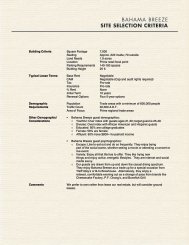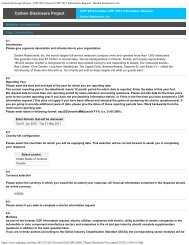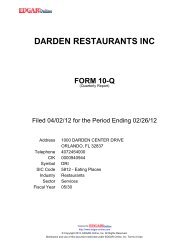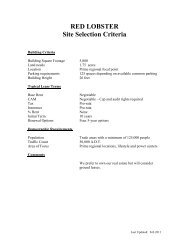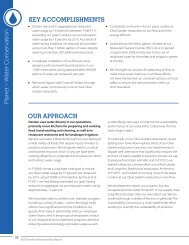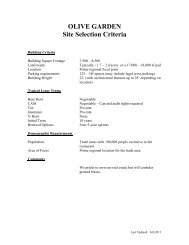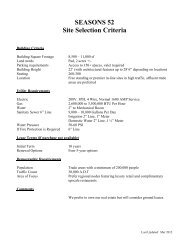Insider Trading Policy - Darden Restaurants
Insider Trading Policy - Darden Restaurants
Insider Trading Policy - Darden Restaurants
You also want an ePaper? Increase the reach of your titles
YUMPU automatically turns print PDFs into web optimized ePapers that Google loves.
to the Company Stock Fund, (b) an election to increase or decrease the percentage of your<br />
periodic contributions that will be allocated to the Company Stock Funds, (c) an election to make<br />
an intra-plan transfer of an existing account balance into or out of the Company Stock Funds,<br />
(d) an election to borrow money against your plan account if the loan will result in a liquidation of<br />
some or all of your Company Stock Fund balance, and (e) your election to pre-pay a plan loan if<br />
the pre-payment will result in allocation of loan proceeds to the Company Stock Fund. None of<br />
these actions should be taken when you possess material nonpublic information.<br />
C. Market Timing in the Company Stock Funds in Savings Plan or FlexComp<br />
Market timing, or frequent short-term trading of mutual fund shares, is viewed negatively by<br />
securities regulators and shareholder advocacy groups. Some investors have used their<br />
employee 401(k) plans or deferred compensation plans like FlexComp to engage in market<br />
timing. Market timing by even a small number of plan participants can be harmful to the other<br />
plan participants- even when it does not violate the law- by driving up the costs of administering<br />
the fund. In addition, market timing by employees in-and-out of the Company Stock Funds,<br />
particularly near the Company’s scheduled release of financial results, can suggest that the<br />
trades were made using inside information, even when this is not the case. The SEC and other<br />
regulators have taken steps to stop market timing practices and punish people who have broken<br />
the insider trading laws through market timing. In light of this close scrutiny, frequent and<br />
excessive trading in the Company Stock Funds is prohibited, and short-term trading in-and-out of<br />
the Company Stock Funds, especially during periods surrounding the Company’s scheduled<br />
release of financial results, is strongly discouraged. The Company reserves the right to<br />
investigate whether market timing is taking place in the Company Stock Funds or in other plan<br />
funds, and could impose greater restrictions to deter these practices. In addition, all executive<br />
officers and members of the Board of Directors of the Company who file reports with the SEC<br />
under Section 16 of the Securities Exchange Act (“Section 16 Filers”) must abide by SEC rules<br />
that prohibit non-exempt opposite way transactions in the Company Stock Funds within any sixmonth<br />
period, and must report all plan transactions involving Company stock or phantom stock on<br />
Form 4 or 5, as applicable.<br />
D. Employee Stock Purchase Plan<br />
The Company's insider trading policy does not apply to automatic periodic purchases through<br />
payroll deduction of Company stock in the Employee Stock Purchase Plan (ESPP). The policy<br />
does apply, however, to voluntary transactions, including your: (a) initial election to enroll in the<br />
ESPP for any enrollment period, (b) election to increase or decrease the amount of your<br />
automatic periodic contributions by payroll deduction to the ESPP, (c) election to cease payroll<br />
deductions altogether and withdraw any accumulated cash, and (d) sales of Company stock that<br />
were purchased under the ESPP, none of which should be done when you possess material<br />
nonpublic information (and, for Designated <strong>Insider</strong>s, should not be conducted during any Blackout<br />
Period as discussed below) . If you participate in the ESPP, and you do not possess material<br />
nonpublic information at the time you enroll, then all subsequent automatic investments by payroll<br />
deduction are allowed without restriction under this insider trading policy.<br />
Finally, Section 16 Filers are not permitted to participate in the ESPP.<br />
E. Dividend Reinvestment Plan<br />
The Company's insider trading policy does not apply to purchases of Company stock resulting<br />
from the automatic reinvestment of dividends paid on Company stock held in the Company's<br />
Direct Advantage Investment Program (“Dividend Reinvestment Plan”). The policy does apply,<br />
however, to voluntary purchases of Company stock under the Dividend Reinvestment Plan<br />
resulting from your initial election to participate in the plan, to make additional contributions, or to<br />
increase your level of participation. The policy also applies to your voluntary sale of any<br />
5



